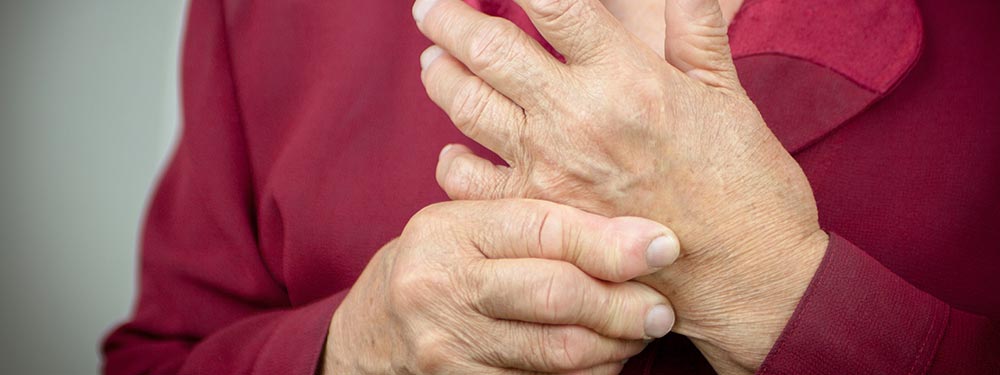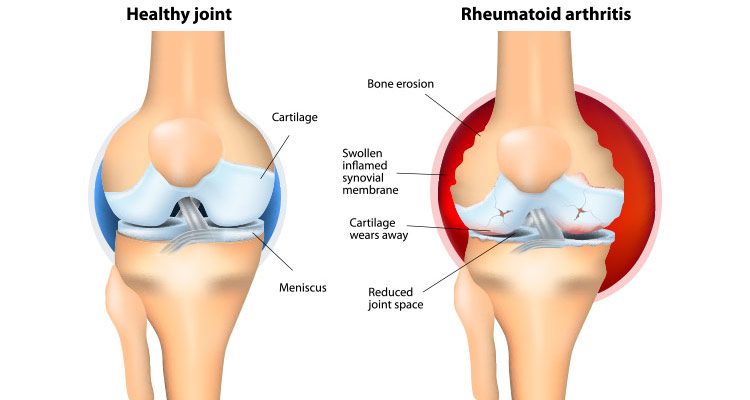Rheumatoid arthritis is a chronic inflammatory autoimmune disorder that causes symptoms of arthritis, affecting many joints, including those in the hands and feet.
In rheumatoid arthritis, the body’s immune system attacks its own tissue, including joints. In severe cases, it attacks internal organs, including the heart, lungs and blood vessels. Rheumatoid arthritis is more common in women than men and it usually develops in individuals over the age of 40. Treatment focuses on controlling symptoms and preventing joint damage, and commonly includes medication to suppress the immune system and reduce pain and inflammation.
Symptoms of Rheumatoid Arthritis
Rheumatoid arthritis is characterized by pain and swelling in the joints. It commonly affects the wrists and fingers but may also affect the elbows, hips, knees and other joints of the body. Additional symptoms may include:
- Tender joints
- Redness and warmth in the joints
- Rheumatoid nodules, or firm bumps of tissue under the skin
- Morning stiffness
- Symmetrical pattern of affected joints
- Fatigue
Diagnosis of Rheumatoid Arthritis
Rheumatoid arthritis may be difficult to diagnose initially because its symptoms often mimic those of other conditions. Rheumatoid arthritis may eventually be diagnosed after a review of all symptoms and a physical examination. Blood tests may be performed to test for the presence of certain antibodies and X-rays may help to assess the level of joint damage.
Your doctor may also do a physical examination to look for:
- Joint swelling, redness, and tenderness
- Limited range in motion
- Joint deformities
Treatment of Rheumatoid Arthritis
While there’s no cure for rheumatoid arthritis, physical therapy and medications can help slow the disease’s progression. Mild cases can be managed with anti-inflammatory medications (NSAIDs). More severe cases can be managed with a class of medications called antirheumatic drugs (DMARDS). Common medications may include:
- Corticosteroids
- Anti-inflammatory medication
- Immunosuppressants
- Disease-modifying antirheumatic drugs
Exercise and physical therapy may also be effective at keeping joints flexible. In severe cases, surgery may be recommended to repair tendons or replace damaged joints.
Prevention of Rheumatoid Arthritis
Simple adjustments can help you protect your joints. Not using arthritic joints enough, overusing them, or using them incorrectly can all worsen the pain and swelling and cause additional joint damage. The following tips and strategies below can help you avoid stiffness and unnecessary stress on joints:
- Avoid holding one position for too long
- Modify tasks to ease the workload on your joints
- Use your strongest joints and muscles
- Prevent falls, which can further damage your joints and cause disability
Need Help Affording Medications?
Patients who are having difficulty paying for their medications, and who have federally funded Medicare, Medicaid, TRICARE, or commercial insurance, may qualify for additional support from the following foundations below:
- Chronic Disease Fund | www.cdfund.org | 877-968-7233
- Patient Access Network Foundation | www.panfoundation.org | 866-316-7263
- The Healthwell Foundation | www.healthwellfoundation.org | 800-675-8416
- Patient Advocate Foundation | www.copays.org | 866-512-3861




